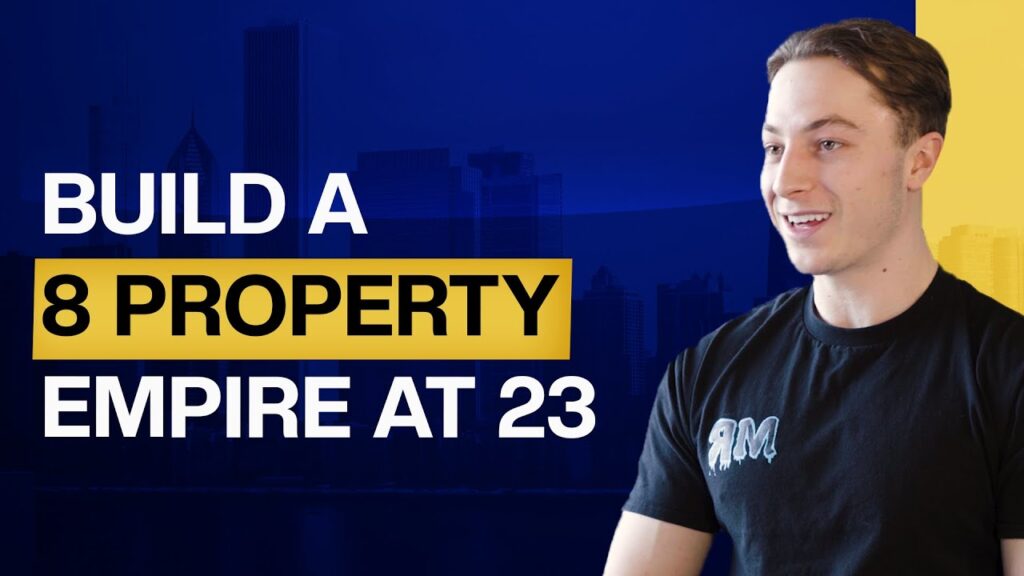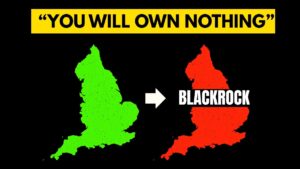Former salesman Ollie Laing sold his Lifetime ISA to join the Samuel Leeds Academy. Now he controls more than 30 properties, making around £10,000 a month from renting them out as serviced accommodation. The 27-year-old built up his business from scratch with no money after contacting 800 Airbnb owners, offering to manage their accommodation for them. Two agreed, giving him a platform to expand his operation.
Portfolio includes an aparthotel
Ollie had just left university and was working in a new build sales job when he decided he no longer wanted to live at home and started looking for a place of his own.
He couldn’t afford a one or a two-bedroom flat. So, he started searching for other options and found out it was possible to rent a room in a house. It was called an HMO (house in multiple occupation), though he had never heard of the concept until then.
Before long Ollie had moved into one which was when he made his next discovery. Each tenant was paying £700 a month and there were seven rooms.
The graduate did his sums and realised the landlord was earning a huge sum from just one house. It was at that point that Ollie researched how to get into property himself and came across Samuel’s YouTube videos.
He watched them religiously every night and then attended one of Samuel’s £1 crash courses in December 2022 to find out more.
“Samuel started talking about deal sourcing. I was like this is amazing. I want to find deals. I want to learn how to do this,” recalls Ollie.
After signing up for the deal selling course, he enrolled on the year-long academy programme. By now he was no longer working in sales and was under pressure to make it work, especially when it took him a while to find the right route to success.
“It’s so scary when you’ve got no money, you’re deep in your overdraft, and you’re having to borrow money from different places,” he admits.
Ollie tried initially to find an HMO deal which he could sell to an investor for a fee. When that failed, he switched his attention to securing a buy, refurbish, refinance deal. Again, he struggled. Despite identifying good opportunities, he could find no one to sell them to.
Refusing to give up, the young trainee spoke to other academy members and established that they were looking for rent-to-rents. That was where his focus then turned.
Ollie teamed up with two other entrepreneurs, whom he had met on the deal selling course. Together they formed a partnership, called The Alliance.
The trio devised a novel way to win business. Realising their fellow students were either investors or deal sourcers, Ollie and his partners, Steven Rich and Isaac Maynard-Smith, set up an online marketplace to introduce the two groups to each other.
“Every time we spoke to someone we’d ask them are you an investor or a deal sourcer? Oh, I’m a deal sourcer. Brilliant. Scan this QR code and you go into a WhatsApp group chat. You’ll be in our sourcing team. If you’re an investor, youre in this WhatsApp chat.”
Slowly they built up a list of investors and co-sourcers, and matched them up with deals, acting as the broker and picking up a commission.
However, after several months had gone by, Ollie and his partners concluded they were not making enough money and pulled out.
“We’d sell a deal for £3,000. 50 per cent would go to a sourcer. We’d then have three of us to split that between and then we’d need to keep money in the business as well.
“After you’ve sold a £3,000 deal you might make £300 or £400 each. It wasn’t worth it. So, we then stopped that. But while we were doing that, we got our own rent-to-rent deal which was the seven suites in Liverpool.”
This was a block of seven apartments which they kitted out and is now run as a hotel.
Short stay accommodation brings in £2,000 a day
The hotel venture led to Ollie going it alone with his own portfolio. He now controls 35 properties, mainly in the southeast. Of those, 28 are ones which he set up. The other seven are part of the hotel business, he points out.
These days his activities revolve largely around managing Airbnbs for the owners, as opposed to taking on rent-to-rents or sourcing investments.
The total monthly profit amounts to around £10,000, with the hosts benefiting to the tune of £2,000 a day in terms of the revenue. Out of that, they pay a 15 per cent management charge, plus sign-up fees, says Ollie.
He finally chose to concentrate on managing short-stay accommodation after he and his partners invested heavily in the seven suites in Liverpool and became experts in the sector.
“We learnt so many different strategies on how to make a good Airbnb work. Then other people were saying this seems like it’s doing well. Can you give me a hand?
“I said I’m not doing it yet, but I kept them on contact. Suddenly I was at a point where I needed to make it work. The deal sourcing wasn’t working, and I just needed to make some money.”
Ollie reached out to the people who had been in touch with him and found more Airbnb owners by looking on the website itself.
Again, the entrepreneur demonstrated his initiative by creating a database of potential leads. He zoomed in on his hometown of Maidstone and obtained the URL for each serviced accommodation property listed in the area.
By the end of the exercise, Ollie had links to 800 properties which he recorded on a spreadsheet. He ranked each one according to how good the description and photographs were and whether it was being run by a professional host or an individual.
His next step was to send a templated message to every owner, offering his management service.
“From the 800 enquiries I got two people say yes. One was a flat in central Maidstone. Another one was a shed in someone’s garden, but that’s all I needed to start.”
Ollie looks back at that moment with some pride. “Bear in mind I’ve got an Airbnb that’s been open a week. I’ve got no reviews. No trading history. No listings. [You wonder] who’s going to trust you. Somehow these people did.”
The flat is in a block of 19, 10 of which he now manages. Before taking them on there was a price war with different rent-to-rent operators running a lot of the apartments. While there carrying out work, they would ask guests how long they were staying for and what they were paying.
In many cases, the guests were staying for a month and would be offered a lower rate to return to another flat in the block, if they needed a longer stay. It was ‘a race to the bottom’ and a ‘cesspit of conflict’ until he became the principal manager.
Ollie set the price higher because he had a monopoly and now everyone makes money, he says.
Ollie takes on his first team member
Ollie’s earnings have increased steadily as his experience has grown, far outstripping his previous annual salary of £27,000.
He now receives referrals too. One of his customers is his girlfriend’s mother who entrusted her property to him after seeing how well his other units were performing. She is now making ‘some good money’ from renting out the family home for a month at a time on Airbnb. When it is occupied, she moves to the house of an elderly relative who is no longer living there.
The two-bedroom house in Rochester brings in about £1,300 a week which is more lucrative to her than a standard let. The downside with serviced accommodation is that the income is not guaranteed, Ollie says. On the other hand, it is easier to evict a guest for non-payment than a tenant who has certain rights.
He has installed smart locks in his properties to protect himself. His guests pay him upfront. But if they outstayed their welcome, he could delete the door code to lock them out – and their possessions in.
Various pieces of software enable him to run his business with the minimum of fuss, including one to manage the cleaning and maintenance of his Airbnbs – along with an automated pricing tool and a channel manager to co-ordinate bookings.
He also uses a guest portal which shows check-in details and can provide lock codes for the doors, as well as information about what to do in the area.
“If you want to book an Uber through it you can. It’s amazing this guest portal, and everyone gets a link to that.”
In addition to this systemisation, he has recently hired his first team member who has been appointed as operations manager. This will allow him to search for new business and develop his marketing side.
The businessman has a firm idea of which properties work best as serviced accommodation. It depends on the area and the type of guest he is aiming to attract. He regards a house with two or three bedrooms and driveway parking as ideal for families and contractors.
It must have at least one parking spot. Having two spaces is ‘perfect’ because either category of people might have more than one vehicle and want off-street parking.
In double rooms, he looks for a super king size bed with a zip lock which can be undone to split it into two single beds.
“Contractors at the end of the day don’t want to kick off their boots and sleep together in the same bed. They’d rather split the beds and you can put two people in one double room, instead of just having one person in one double room. So, it increases the amount of people who can stay there.
“If you’ve got a two-bed house, you can have four people sleeping in there. So, you’ve effectively doubled how many bedrooms you’ve got just by having an extra bed.”
It gives him the added flexibility of catering for married couples and single people.
Ollie has now been a property manager long enough to earn himself the badge of being an Airbnb superhost. It gives the person booking his places confidence that he is ‘legit’ because he has a certain number of reviews and percentage star ratings.
When Ollie sold his Lifetime ISA to train with Samuel Leeds on the academy, his mother was unhappy. She had advised him to invest in one to help him buy a house.
Ollie, however, felt his money was effectively trapped in the ISA because he could only use it for that reason. There was a penalty to take it out, but it was one of the best decisions he ever made, he says.
The academy provided not only a comprehensive education in property, but also mentoring, support and invaluable contacts.
“For the networking it’s incredible. It’s probably the best place to network with like-minded people. It’s an amazing experience.”
Ollie’s tips
- You’ve got to work hard and relentlessly to be successful in property.
- Your listing is the gateway to the market. If the photos are done badly and you’ve not invested in the space, it’s not going to do well, even if you’ve got a good location.
Samuel Leeds
“It’s remarkable what Ollie’s achieved. His journey proves that with the right strategy, persistence, and mentorship, anyone can break into the property industry and achieve financial freedom.”






